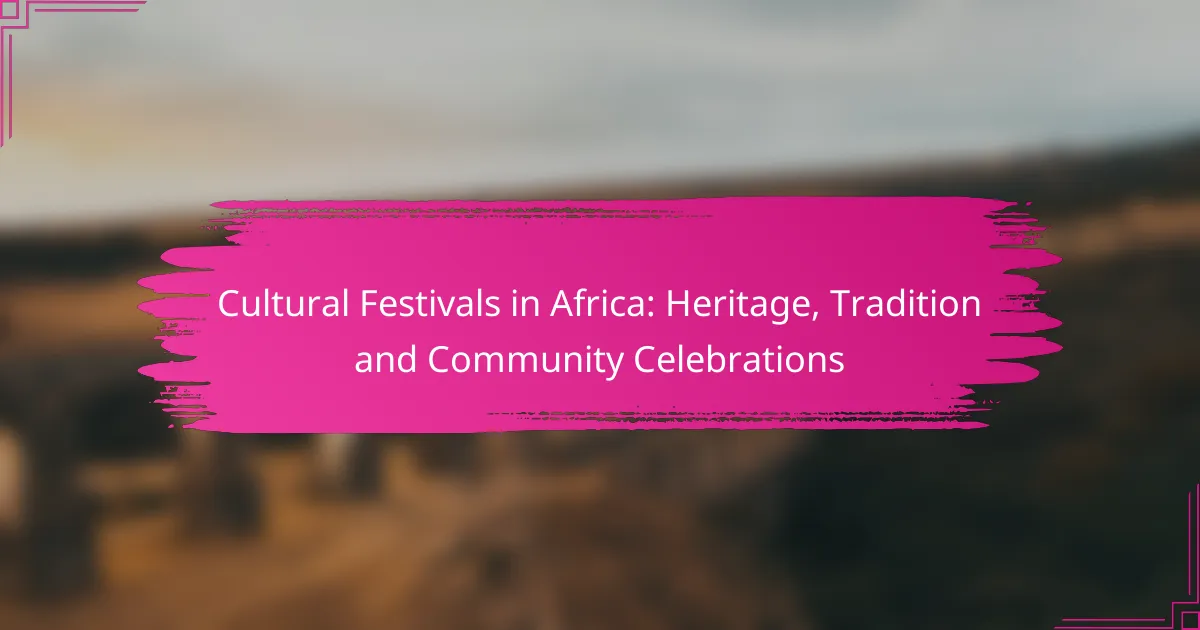Africa is home to a vibrant array of cultural festivals that celebrate the continent’s rich heritage, traditions, and community spirit. These events showcase a diverse tapestry of music, dance, art, and local customs, attracting both locals and tourists eager to engage with the cultural richness of the region. By fostering community interaction and collaboration, these festivals play a crucial role in preserving historical practices and promoting cultural identity.
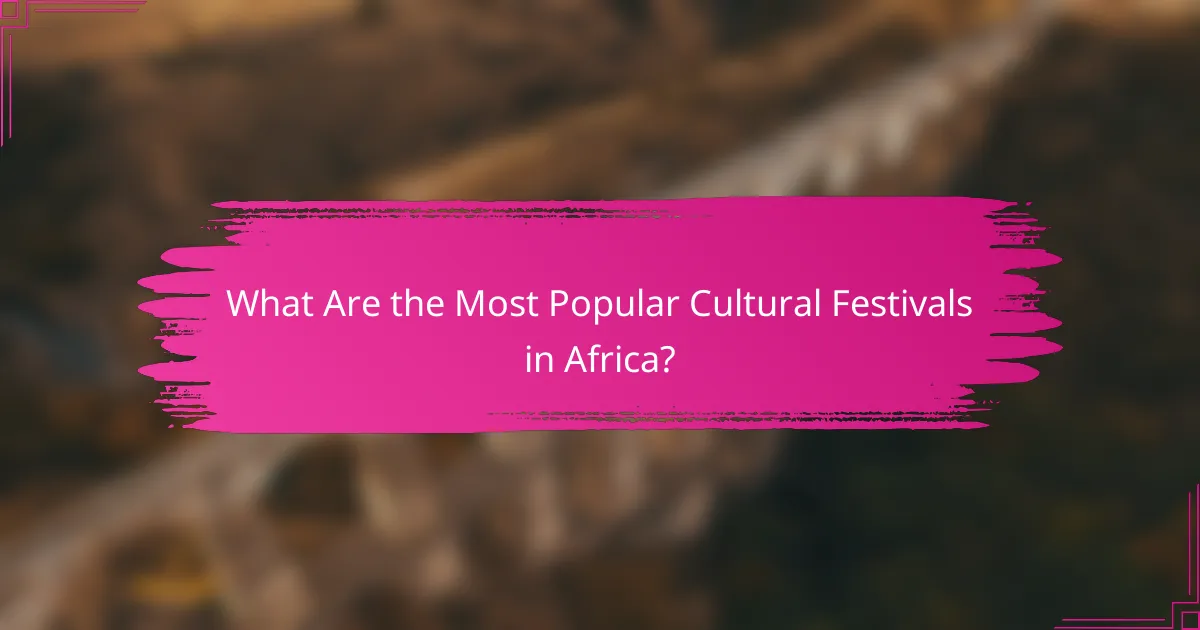
What Are the Most Popular Cultural Festivals in Africa?
Africa hosts a vibrant array of cultural festivals that celebrate heritage, tradition, and community spirit. These festivals often showcase music, dance, art, and local customs, drawing both locals and tourists alike to experience the rich cultural tapestry of the continent.
Durbar Festival
The Durbar Festival is a grand celebration held in several northern Nigerian cities, particularly during Eid al-Fitr and Eid al-Adha. It features a spectacular parade of horsemen dressed in colorful traditional attire, showcasing the region’s rich Islamic heritage.
Visitors can expect to see elaborate displays of horsemanship, music, and cultural performances. The festival is not only a visual feast but also an opportunity to engage with local traditions and enjoy traditional foods.
Fes Festival of World Sacred Music
Taking place in Fes, Morocco, the Fes Festival of World Sacred Music is a unique event that brings together artists from various spiritual and cultural backgrounds. This festival aims to promote peace and understanding through music, featuring performances in historic venues throughout the city.
Attendees can enjoy a diverse lineup of artists, ranging from traditional Moroccan musicians to international acts. The festival also includes workshops and discussions, making it a rich experience for those interested in cultural exchange.
Gerewol Festival
The Gerewol Festival is an annual event celebrated by the Wodaabe people of Niger, known for its vibrant beauty contests among young men. This festival is a display of courtship rituals, where men adorn themselves with elaborate makeup and traditional attire to attract potential partners.
Visitors can witness captivating performances, including traditional dances and songs that highlight the Wodaabe’s rich cultural heritage. The festival typically occurs during the rainy season, making it a lively gathering for both locals and tourists.
Lake of Stars Festival
The Lake of Stars Festival is a popular music and arts festival held on the shores of Lake Malawi. It attracts both local and international artists, offering a platform for diverse musical genres and artistic expressions.
Festival-goers can enjoy live performances, art installations, and workshops. The stunning lakeside setting enhances the experience, making it a must-visit for those looking to immerse themselves in Malawian culture.
Timkat Festival
Timkat is an Ethiopian Orthodox celebration of Epiphany, marking the baptism of Jesus in the Jordan River. This vibrant festival features colorful processions, traditional music, and the blessing of the water, drawing large crowds in cities like Addis Ababa.
Participants often wear traditional white garments and carry replicas of the Ark of the Covenant. The event is not only a religious observance but also a time for community bonding and cultural expression, making it a significant highlight of Ethiopian heritage.
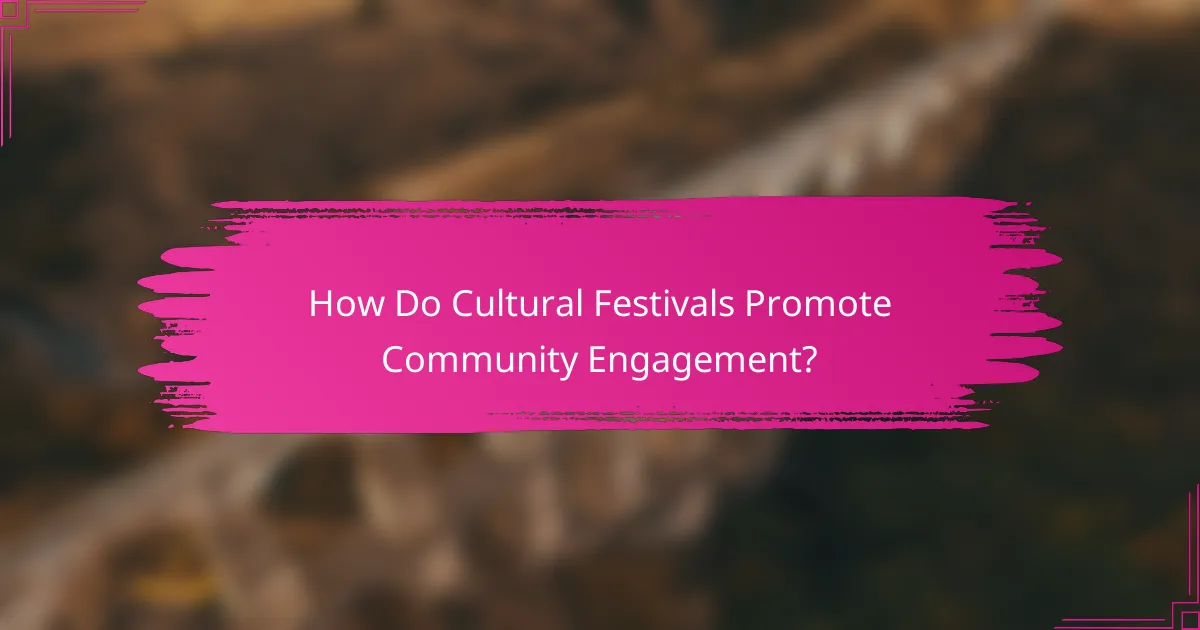
How Do Cultural Festivals Promote Community Engagement?
Cultural festivals promote community engagement by bringing people together to celebrate shared heritage and traditions. These events foster interaction among community members, encouraging participation and collaboration in various activities.
Encouraging Local Participation
Cultural festivals create opportunities for local residents to actively participate in planning and executing events. This involvement can range from organizing performances to setting up stalls that showcase local crafts and cuisine. By engaging community members, festivals cultivate a sense of ownership and pride in local culture.
For example, in many African festivals, local artists and performers are invited to showcase their talents, which not only enhances the festival experience but also supports local talent. This participation often leads to increased volunteerism and community spirit.
Strengthening Cultural Identity
Cultural festivals play a vital role in reinforcing cultural identity by celebrating unique traditions and practices. They provide a platform for communities to express their heritage through music, dance, art, and storytelling. This expression helps preserve cultural narratives and fosters a sense of belonging among participants.
In regions like West Africa, festivals often highlight traditional attire and rituals, allowing younger generations to connect with their roots. Such events can instill pride in cultural heritage, encouraging individuals to embrace and promote their identity.
Fostering Economic Growth
Cultural festivals can significantly contribute to local economies by attracting visitors and generating revenue. These events often lead to increased sales for local businesses, including food vendors, artisans, and hotels. The influx of tourists can provide a substantial economic boost to the community.
For instance, festivals in South Africa often see thousands of visitors, creating opportunities for local entrepreneurs to thrive. Communities can maximize benefits by promoting local products and services during these events, ensuring that economic gains remain within the community.
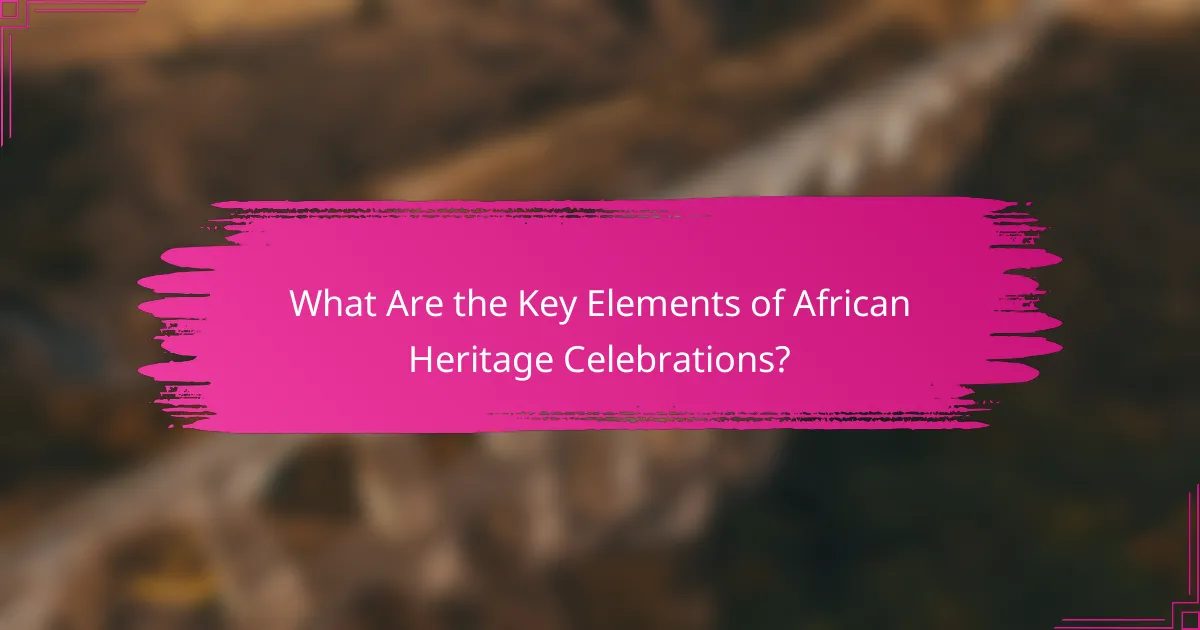
What Are the Key Elements of African Heritage Celebrations?
African heritage celebrations are vibrant events that showcase the continent’s rich cultural diversity through music, dance, crafts, and culinary traditions. These festivals foster community spirit and preserve historical practices, making them essential for cultural identity.
Traditional Music and Dance
Traditional music and dance are central to African heritage celebrations, often serving as a means of storytelling and cultural expression. Each region has its unique styles, rhythms, and instruments, such as the djembe drum in West Africa or the mbira in Southern Africa.
During festivals, performances can range from communal dances to solo acts, inviting audience participation. Engaging in these activities not only entertains but also strengthens community bonds and passes down traditions to younger generations.
Artisan Crafts and Exhibitions
Artisan crafts play a crucial role in African heritage celebrations, showcasing the skills and creativity of local artisans. Crafts may include beadwork, pottery, weaving, and wood carving, each reflecting the cultural significance of the community.
Exhibitions often feature stalls where visitors can purchase handmade items, supporting local economies. It’s important for festival organizers to ensure that artisans are fairly compensated for their work, promoting sustainable practices within the community.
Culinary Traditions
Culinary traditions are a vital aspect of African heritage celebrations, offering a taste of local flavors and cooking techniques. Dishes vary widely by region, with staples like injera in Ethiopia, jollof rice in West Africa, and biltong in Southern Africa being popular highlights.
Food stalls at festivals provide an opportunity for attendees to sample diverse cuisines, fostering appreciation for different cultures. Organizers should consider dietary restrictions and promote local ingredients to enhance the culinary experience while supporting local farmers.
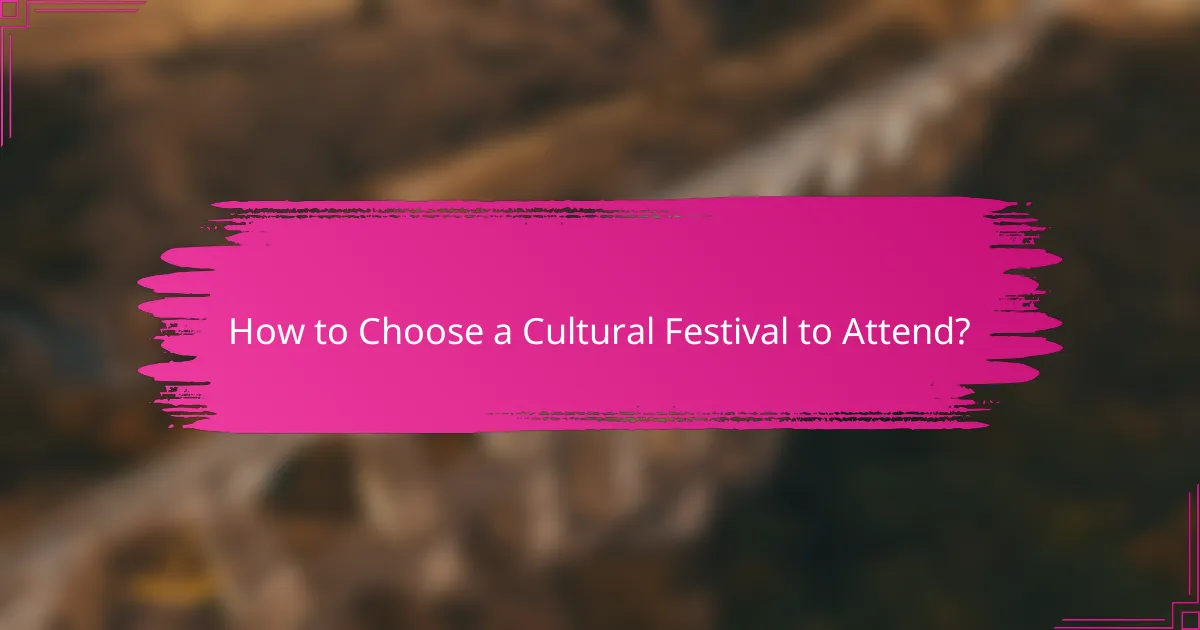
How to Choose a Cultural Festival to Attend?
Choosing a cultural festival to attend involves considering factors such as location, themes, and timing. By evaluating these elements, you can select a festival that aligns with your interests and logistical needs.
Consider Location and Accessibility
Location is crucial when selecting a cultural festival. Look for festivals that are within reasonable traveling distance, whether by car or public transport. Consider the accessibility of the venue, including facilities for individuals with disabilities.
Research local accommodations if you plan to stay overnight. Popular festivals may attract large crowds, so booking hotels or lodgings in advance is advisable to secure a convenient spot.
Evaluate Festival Themes and Activities
Different festivals focus on various themes, such as music, dance, food, or art. Identify what interests you most and look for festivals that highlight those aspects. For instance, if you enjoy traditional music, seek festivals known for their live performances.
Check the schedule of activities to ensure there are events that appeal to you. Some festivals may include workshops, exhibitions, or competitions that can enhance your experience.
Check Dates and Duration
Dates and duration are essential when planning your festival visit. Verify the festival dates to avoid conflicts with other commitments. Many cultural festivals last several days, so consider how much time you can dedicate to attending.
Some festivals may have specific days for particular events, so review the itinerary carefully. If possible, plan to attend on a day with the most activities that interest you to maximize your experience.
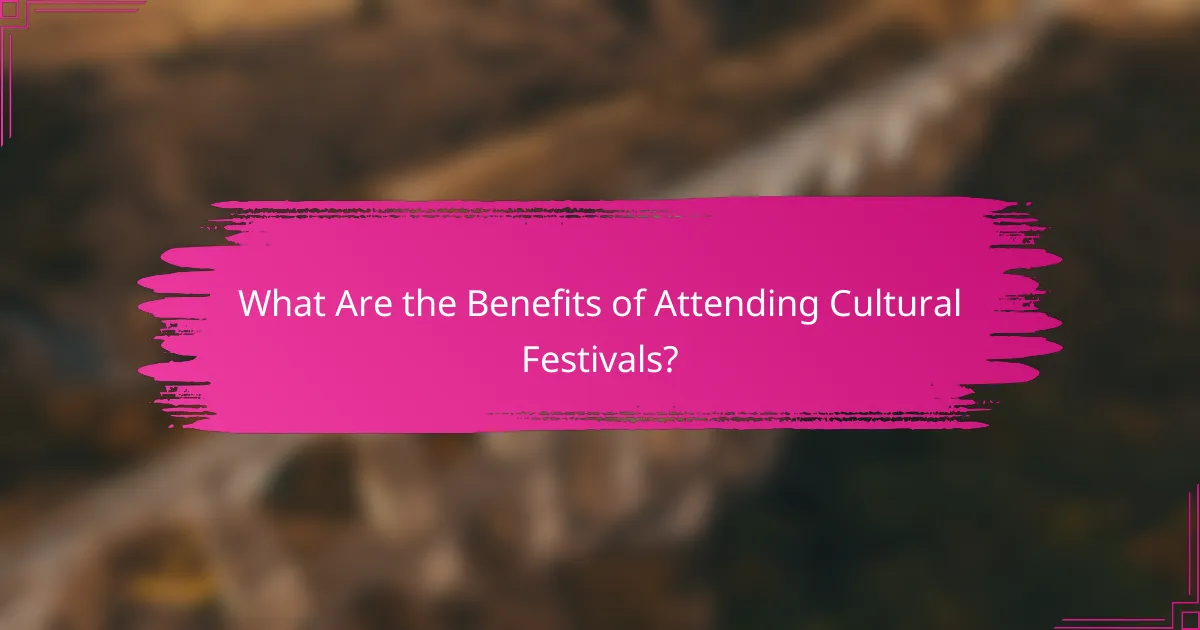
What Are the Benefits of Attending Cultural Festivals?
Attending cultural festivals offers numerous benefits, including the opportunity to immerse oneself in diverse traditions and strengthen community ties. These events foster a deeper understanding of heritage while providing a platform for social interaction and networking.
Experiencing Authentic Culture
Cultural festivals provide a unique chance to experience authentic traditions and practices firsthand. Attendees can engage with local artisans, taste traditional foods, and witness performances that reflect the community’s history and values.
For instance, festivals like the Harare International Festival of the Arts in Zimbabwe showcase local music, dance, and visual arts, allowing visitors to appreciate the richness of African culture. Participating in workshops or demonstrations can further enhance this immersive experience.
Networking Opportunities
These festivals serve as excellent networking platforms, connecting individuals with similar interests and professionals in various fields. Attendees can meet artists, entrepreneurs, and cultural advocates, fostering collaborations and friendships.
To maximize networking potential, consider attending workshops or panel discussions where you can engage with speakers and fellow participants. Bringing business cards or promotional materials can also help facilitate connections that extend beyond the festival.
